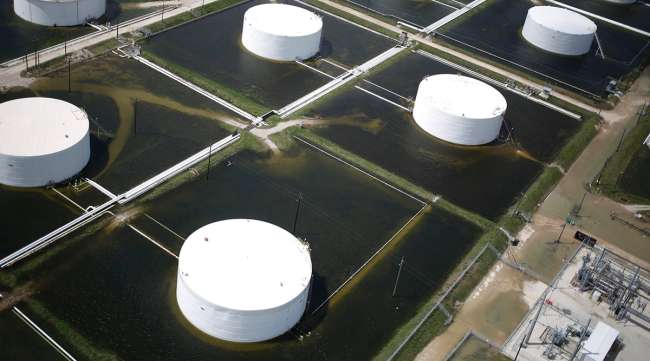Harvey’s Floods Could Delay 10% of US Fracking, Analyst Says

As much as 10% of U.S. fracking work could be delayed after Hurricane Harvey ripped through southeast Texas, soaking thousands of miles of dirt roads snaking through one of the nation’s busiest oilfields.
More than half of the rigs running in Texas’ Eagle Ford Shale are estimated to have suspended drilling because of the storm, Marshall Adkins, an analyst at Raymond James & Associates Inc., wrote Aug. 31 in a note to clients. The muddy conditions left in Harvey’s wake will hinder the fracking sector that has consistently lagged speedier drilling crews.
Located in far southeastern Texas, the Eagle Ford was the only major American shale formation in the crosshairs of Harvey when it slammed ashore as a Category 4 hurricane last week. Major explorers including EOG Resources Inc. and Marathon Oil Corp. halted drilling and evacuated crews in anticipation of the storm, crimping as much as 57% of daily production, according to the Texas Railroad Commission.
TRUCKING IMPACT: 10% of U.S. trucking affected, FTR reports
TRUCKING STOCKS CLIMB: High demand expected for cleanup
TRUCKER RESCUED: Driver pulled from his cab as floodwaters rise on Beltway 8
GAS SHORTAGE: Texas drivers rush to fill tanks
OIL SHIPMENTS DISRUPTED: Refineries disabled in deluge
VOLUNTEERS JUMP IN: Fleets saved the stranded, delivery supplies by boat
FEDERAL FUNDS: FHWA gives $25 million to Texas relief
SUSPENDED DELIVERIES: FedEx Freight, Express service curtailed
HARVEY'S IMPACT: Oil, gas prices and overall economy to be affected
“Given that much of oil and gas activity occurs in areas only accessible via dirt roads, the heavy rainfall usually makes the movement of trucks and supplies much more difficult,” Adkins wrote. “The trucking and rail of sand, chemicals, and personnel to the well site will all take more time given the likely nasty condition of many Eagle Ford access roads.”
The Eagle Ford was the only shale basin of the big four to drop activity last week, as some in the industry start to look at shale as a more expensive option compared to other places.
The temporary drop in the rig count by as much as 45 rigs due to flooding could be a catalyst for higher oil prices, Adkins wrote.



